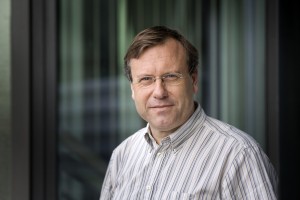 Transforming growth factor-β (TGF-β) is a secreted homodimeric protein that regulates numerous responses, such as proliferation, differentiation, migration and apoptosis. TGF-β is the prototypic member of a family of 33 structurally related pleiotropic cytokines. Members of the TGF-β superfamily have crucial roles in development and tissue homeostasis. We are interested in unraveling mechanisms by which transforming growth factor-β (TGF-β) family members elicit their multifunctional cellular effects and how perturbation in their signal transduction pathways contribute to human diseases. Previous research from us and other laboratories have now firmly established the intracellular signaling cascade of TGF-β via serine/threonine kinase receptors and SMAD transcriptional effectors. However, how this pathway is (mis)regulated in cancer and other diseases, remains not well understood. The present focus within our group is on 1) the identification of novel critical regulators of TGF-β family signaling pathways using functional genetic screens, 2) how TGF-β specificity and bioavailability is regulated via known (co-) receptors and ligand binding proteins and 3) interplay with other signaling pathways. In particular, we study the involvement of TGF-β family members in the metastasis of cancer cells, tumor angiogenesis and high/low bone mass diseases. We use 3-dimensional cell culture systems that allow for a functional analysis of homo- and heterotypic cell-cell interactions in structures that resemble those found in vivo. Moreover, mouse models are used that mimic diseases with misregulated TGF-β signaling. Our long term aim is to translate our findings towards the development of novel treatment modalities.
Transforming growth factor-β (TGF-β) is a secreted homodimeric protein that regulates numerous responses, such as proliferation, differentiation, migration and apoptosis. TGF-β is the prototypic member of a family of 33 structurally related pleiotropic cytokines. Members of the TGF-β superfamily have crucial roles in development and tissue homeostasis. We are interested in unraveling mechanisms by which transforming growth factor-β (TGF-β) family members elicit their multifunctional cellular effects and how perturbation in their signal transduction pathways contribute to human diseases. Previous research from us and other laboratories have now firmly established the intracellular signaling cascade of TGF-β via serine/threonine kinase receptors and SMAD transcriptional effectors. However, how this pathway is (mis)regulated in cancer and other diseases, remains not well understood. The present focus within our group is on 1) the identification of novel critical regulators of TGF-β family signaling pathways using functional genetic screens, 2) how TGF-β specificity and bioavailability is regulated via known (co-) receptors and ligand binding proteins and 3) interplay with other signaling pathways. In particular, we study the involvement of TGF-β family members in the metastasis of cancer cells, tumor angiogenesis and high/low bone mass diseases. We use 3-dimensional cell culture systems that allow for a functional analysis of homo- and heterotypic cell-cell interactions in structures that resemble those found in vivo. Moreover, mouse models are used that mimic diseases with misregulated TGF-β signaling. Our long term aim is to translate our findings towards the development of novel treatment modalities.
ten Dijke
Biography
Peter ten Dijke received his Ph.D. degree in 1991 from Wageningen University, The Netherlands based on his research on the identification of the third isoform of TGFβ performed at Oncogene Science, Inc., New York, USA. He did his postgraduate studies with Kohei Miyazono and Carl-Henrik Heldin at the Ludwig Institute for Cancer Research (LICR), Uppsala, Sweden. In 1994, he became group leader at LICR and in 1999 he moved to the Netherlands Cancer Institute, Amsterdam, The Netherlands. In 2005 he moved to the Leiden University Medical Center, Leiden, The Netherlands, and is currently a professor of molecular cell biology at Leiden University. His laboratory studies the molecular mechanisms by which TGFβ family members elicit their cellular effects via (co)receptors and intracellular SMAD effectors, and how subverted TGF family signaling is involved in cancer, vascular and bone diseases.